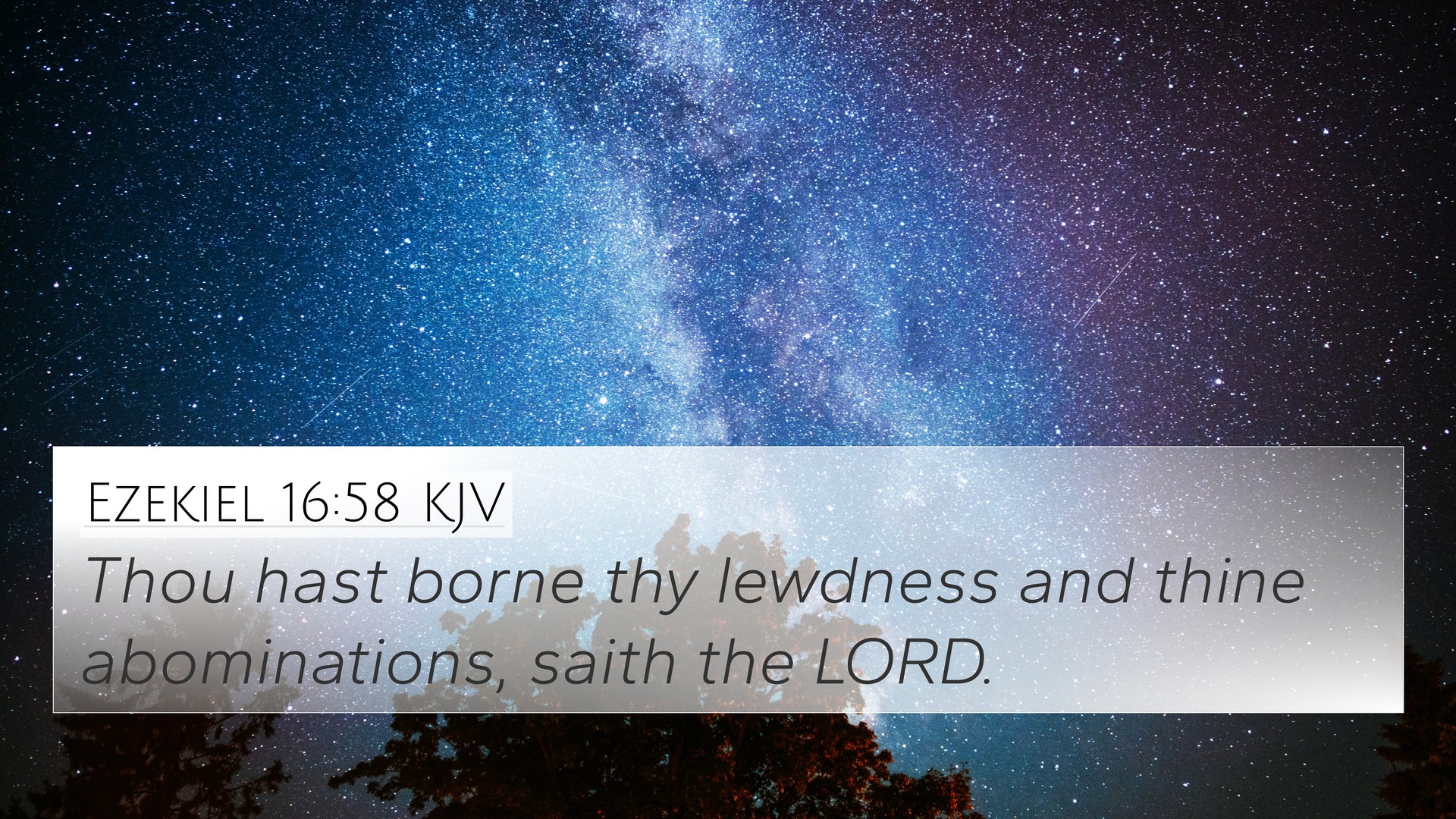Ezekiel 16:58 - Scripture Meaning and Interpretation
Ezekiel 16:58 states:
"Thou hast borne thy lewdness and thine abominations, saith the Lord."
This verse is part of God's indictment against Jerusalem, depicted as an unfaithful bride. The prophet Ezekiel conveys the severity of the nation's spiritual infidelity and moral decay.
Summary of Interpretations
The interpretations of this verse call attention to several key themes:
- Spiritual Idolatry: Jerusalem's actions are likened to adultery against God, showing their betrayal of the covenant.
- Moral Corruption: References to lewdness and abominations underscore the nation's wickedness and rejection of God's law.
- Divine Judgment: The phrase emphasizes the repercussions of such rebellion, illustrating the seriousness of abandoning divine instructions.
Commentary Insights
- Matthew Henry: He emphasizes that the Lord uses very strong language to express His disgust over Israel's actions, portraying them as shameful and offensive. He calls attention to the spiritual commitment that was breached.
- Albert Barnes: In his commentary, Barnes highlights the historical context of Israel's infidelity through alliances with pagan nations, likening their behavior to that of a disloyal spouse. He brings forth the idea that their actions warranted divine displeasure.
- Adam Clarke: Clarke elaborates on the depth of the visual language used, explaining that God’s discontent reflects the covenant relationship that Israel had broken through their multitude of sins and violations of God’s commands.
Cross References
This verse strongly connects to several other scriptures that enhance understanding of its themes:
- Jeremiah 3:6-10: Discusses Israel's unfaithfulness and God's call for repentance.
- Ezekiel 23:1-49: Further elaborates on the metaphor of the two sisters, Oholah and Oholibah, representing Samaria and Jerusalem.
- Hosea 2:5: Illustrates Israel's acts of infidelity and the consequences of turning away from God.
- Isaiah 1:21: Highlights the state of Jerusalem as having turned corrupt and lost its righteousness.
- Revelation 2:4-5: Causes reflection on what it means to leave one's first love in the New Testament context.
- 1 Corinthians 10:6-11: Draws lessons from Israel's history, warning against similar behaviors.
- James 4:4: Equates friendship with the world as enmity with God, resonating with the call against spiritual infidelity.
Tools for Understanding
For those wishing to delve deeper into the connections of Scripture, various tools can aid in cross-referencing:
- Bible Concordance: A useful resource to find words and phrases across different verses.
- Bible Reference Resources: Helps locate thematic connections between scriptures efficiently.
- Cross-Reference Bible Study Methods: Techniques to study scriptures in a comparative manner, understanding their interrelations.
- Comprehensive Bible Cross-Reference Materials: Detailed guides available for deeper Biblical research.
Applying the Verse to Life
Ezekiel 16:58 serves as a sobering reminder of the seriousness of fidelity in our relationship with God. It challenges believers to reflect on their commitments and avoid spiritual compromise.
Conclusion
Through the lens of Ezekiel 16:58, one can examine the depth of Biblical themes surrounding unfaithfulness, divine judgment, and the importance of remaining loyal to God. This verse invites readers not only to understand the historical context but also to apply the lessons to contemporary life, reinforcing the necessity of steadfastness in faith. For biblical scholars and lay readers alike, the insights gained through cross-referencing and thematic linking enhance the understanding of God’s word and its relevance across both the Old and New Testaments.





